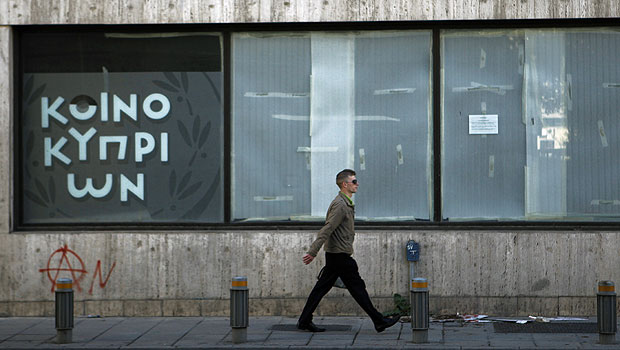
A man passes an empty closed branch of Bank of Cyprus in central capital Nicosia, Cyprus, Sunday, March 24, 2013. (AP Photo)
The imposition of strict controls on the movement of capital is just one of the consequences of the affair, and the possibility of a run on the banks still looms, with the country’s largest, and most troubled, financial institutions deliberately shuttered for most of this week as a precautionary measure. This is to say nothing of the decision to force major savers at the most troubled banks to contribute to recapitalization, with as much as 40 percent of their assets in return for shares as part of the bailout agreement.
However, despite the scale of the crisis that has rocked Cyprus and the rest of Europe, Arab economists and financial analysts are optimistic that investors in the Middle East will be able to avoid most of the fallout.
Regarding Arab deposits in Cypriot banks, Dr. Saeed Al-Sheikh, a senior economist at Saudi Arabia’s National Commercial Bank, told Asharq Al-Awsat that “if there are any, they will be small. The Cypriot economy is not attractive for Arab deposits compared to the economies and financial centers of other European countries, particularly Britain, Germany, and Switzerland.”
Dr. Sheikh pointed out that “these few Arab funds deposited in Cypriot banks will stem back to the accounts of individuals in Arab countries located on the Mediterranean Sea, specifically Lebanon, but they would certainly not belong to the citizens of countries rich in financial resources such as Saudi Arabia and the Gulf states.” He pointed out that citizens of these countries tend to place sizable foreign deposits in European countries such as Germany and Britain, major trading partners of the Gulf and Saudi Arabia. Dr. Sheikh remarked that London was a global financial center for investments, adding, “London is considered one of the key financial centers attractive for Gulf deposits and investments, and even those who invest in other financial centers often pass through London.”
For his part, George Kanaan, head of the Arab Bankers Association in London, told Asharq Al-Awsat, “I do not think there are large Arab deposits in Cypriot banks, and given that the levy will be imposed on one bank (Bank of Cyprus), I do not foresee any problems.” Commenting on Lebanese deposits in particular, he remarked, “I believe that good Lebanese bankers, and likewise Arab bankers in general, would have taken the necessary precautions in that regard.” Kanaan added that he would not be surprised if the majority of Lebanese deposits in Cyprus were being held in branches of Lebanese banks stationed there. He concluded by saying that Cypriot banks have acted recklessly and unprofessionally, expanding beyond their capabilities, and thus inflicting Cyprus with its current crisis.
